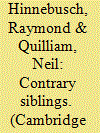| Srl | Item |
| 1 |
ID:
074084


|
|
|
|
|
| Publication |
2006.
|
| Summary/Abstract |
Jordan and Syria, severed parts of the same country, were in many ways 'siblings': their systemic situation, as economically weak small states surrounded by more powerful enemies, was similarly vulnerable; their leaders at the time of the Iraq War were of a similar 'modernising' generation; the identities of their populations were similarly Arab-Islamic. Yet, they followed diametrically opposite policies toward the invasion of Iraq: Jordan bandwagoning with the United States and Syria defying it. This contrary behaviour is explained by their differential experiences of state formation and the differing social forces incorporated and identities institutionalised in Ba'thist Syria and Hashemite Jordan.
|
|
|
|
|
|
|
|
|
|
|
|
|
|
|
|
| 2 |
ID:
145141


|
|
|
|
|
| Summary/Abstract |
This article argues that whilst the relationship between the Gulf Arab states and Asia is developing quickly, it will remain largely transactional for the foreseeable future. The relationship has intensified over the past 5 years and is manifest in increased trade, diplomatic traffic, foreign direct investment and energy relations. This has led some observers to argue that the Gulf Arab states will come to rely more upon Asian, rather than Western partners to provide for their security in the Gulf. The advent of the shale revolution and US energy independence has further underscored this line of analysis. The authors argue, however, that it is unlikely that the relationship between the Gulf Arab states and Asia will become strategic in the near future, as Asian leaders have shown no interest in guaranteeing Gulf security. They are content to bandwagon for as long as possible. Furthermore, the current security arrangement between Gulf Cooperation Council and Western powers, which has stood the test of time, looks likely to endure for decades. In spite of the apparent downturn in relations between Gulf Arab leaders and the West since the Arab Spring, both sides are committed to a long-term strategic relationship.
|
|
|
|
|
|
|
|
|
|
|
|
|
|
|
|